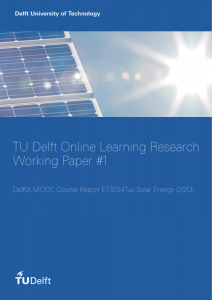Working Paper 1: Solar Energy 2013
 This report is to give more insight in the background, the implementation of the course and the results. The purpose is to provide useful information (and clean data) to the team of developers and teachers and to others to support their aspiration to improve online education. A comparative analysis of the first five DelftX MOOCs can be found in the ‘Working Paper DelftX MOOCs, the first year (2013-2014)’.
This report is to give more insight in the background, the implementation of the course and the results. The purpose is to provide useful information (and clean data) to the team of developers and teachers and to others to support their aspiration to improve online education. A comparative analysis of the first five DelftX MOOCs can be found in the ‘Working Paper DelftX MOOCs, the first year (2013-2014)’.
Summary
The course was designed as a foundation course in Solar Energy, requiring basic knowledge of physics and some mathematical skills. It consisted of 7 modules and an introductory week. The course was at a bachelor- level, designed for a broad range of students. Basic knowledge in physics and such mathematical skills as integration and differentiation were required. In the course video lectures were used, convergent exercises, tests, and animations for illustrating relevant engineering and physical phenomena. It was frequent feedback on the forum from.the news and announcements, included two feedback videos from the teacher and high feedback from the teacher, staff, and selected teacher assistants. The course had a flexible assessment strategy, i.e. the student had a selective choice of which exams to take and still allow a student to successfully complete the course.
The most common reason to subscribe to the course was ‘To increase my knowledge and skills’. The median student age was 28 with a majority of 44 % in the age of 26 to 40 and 74% of the students were male and 15% female. It is clear that the participants constitute a very diverse group of people of which a large part is employed (50% fulltime, 14% part-time) and many of whom have a career in a relevant field.
The biggest challenge for the teacher / developers was time pressure, obviously related to the newness and complexity of the development process of a MOOC. Part of the complexity is the intention to deal with the variety of students in age, location, schooling, living conditions, etc. which is very different and requires a different mindset. Overall, the satisfaction was very high and this was also shown by the high number of students (80%) who intended to continue studying in this field.
Reference
De Vries, P., Hennis, T., Skrypnyk, A., (2015). TU Delft Online Learning Research Working Paper #1: DelftX MOOC Course Report ET3034Tux Solar Energy (2013). Delft, Delft University of Technology. ISBN 9789461864543.





















Comments are closed.